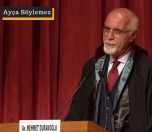Click to read the article in Turkish
"We are aware that what is essential here is to handle the system as a whole in a comprehensive manner. For this reason, we are currently addressing the stages of investigation, prosecution and execution one by one and working on a comprehensive reform in criminal justice. We have established a Science Board to evaluate the changes made so far, to identify additional changes to be made and to present them to Parliament."
Delivering a speech in the 2020 Budget Talks of the Ministry of Justice, Justice Minister Abdulhamit Gül once again talked about judicial reform, announcing that a science board, a concept that we are now familiar with due to the pandemic, would start working for judicial reform.
Minister Gül began his speech by indicating that there was a problem in the system, but, in the meantime, he signalled that the reform in question was once again reduced to the judicial processes.
It was last year when the government prepared the Judicial Reform Strategy Document about this issue and the legal amendments foreseen in the reform packages have been passed into laws by the Parliament. But, these packages have not made much change in the system, either.
Within this context, we have spoken with Ankara Bar Association Chair Erinç Sağkan about the statement of the Justice Minister, what a possible judicial reform must cover and what needs to change.
Like Diyarbakır Bar Association Chair Cihan Aydın and İstanbul Bar Chair Mehmet Durakoğlu, Sağkan has noted that the first thing to do is to change the structure of the Board of Judges and Prosecutors (HSK).
Ankara Bar Association Chair Erinç Sağkan has shared his views on a possible judicial reform briefly in following words:
Emphasis on judicial independence
"Around one and a half years ago, a nine-chapter program was announced under the name of Judicial Reform Strategy Document. Within its frame, three separate judicial packages have been passed into law.
"However, it is not possible to carry out a reform through legal amendments; we have seen it. There is no need for a reform in the laws, anyway; there is a need for a reform not in the judiciary, but in the mindset. And this happens by ensuring that the judiciary is independent. If judicial independence is established, a judicial reform goes through in the country."
'HSK must be freed from government's influence'
Against this backdrop, Ankara Bar Chair Sağkan has listed what needs to be done to make this happen. "The judicial reform in Turkey must begin in the education given at the law faculties. The quality of education in over 120 faculties of law must be increased," he has said and added:
"Moreover, the structure of the HSK needs to change. The Minister of Justice and the Deputy Minister of Justice must no longer be members of the board. A significant step can be taken in the direction of establishing judicial independence by freeing the HSK from the government's influence.
"When the appointment of judges and prosecutors is considered, an appointment based on meritocracy must be prioritized, rather than references among people, and selections must be made accordingly.
"The interviews must be videotaped so that the interviewees can have the right to seek justice and a representative from the Union of Turkish Bar Associations (TBB) must be present in the interviews.
"Lastly, ensuring the independence of the defense is the most important requisite for an independent judiciary. It needs to be ensured that lawyers are not subjected to investigation or prosecution by being associated with the crimes allegedly committed by their clients. Bars must not be politicized by a system such as multiple bar associations. The way for judicial independence must be cleared with an independent defense...
"Reiterating universal principles of law such as the exceptionality of imprisonment without making these arrangements would not cater to judicial reform. If judges and prosecutors are freed from pressure, universal principles of law will be implemented anyway."
'Meritocracy replaced by loyalty'
Sağkan has also commented on the remarks of Justice Minister Gül, who said, "With the presumption of innocence, the right against self-incrimination and right to a fair trial, we are determined to esteem the law, which the militants disguised as judges attempted to trample upon."
Sağkan has said, "During the plot trials, we saw how great damage the instrumentalization of the law inflicted on this country. We witnessed its harms on freedom of press and expression and freedom of communication.
"While several judges and prosecutors were discharged from profession in the aftermath of July 15 [coup attempt in 2016] and they have been replaced by new ones, we have seen that meritocracy has been replaced by loyalty to certain parties in these selections.
"Reform cannot be put into practice here, either. The instrumentalization of the law now turns judges and prosecutors into scapegoats.
"We see that the ones who select judges and prosecutors, the ones who have created the judges and prosecutors who are forced to bow down to political pressure are now complaining about it.
"We and the press can make these warnings; however, the authority assigned with finding solutions does not have the right to complain. If there is pressure on judges and prosecutors, which is true, then, it must find solutions to do away with this pressure.
"Eliminating the government's influence on the HSK would be the first step within this context. This would be the major indicator of whether the government is sincere about its talks of reform or not." (AS/SD)
















